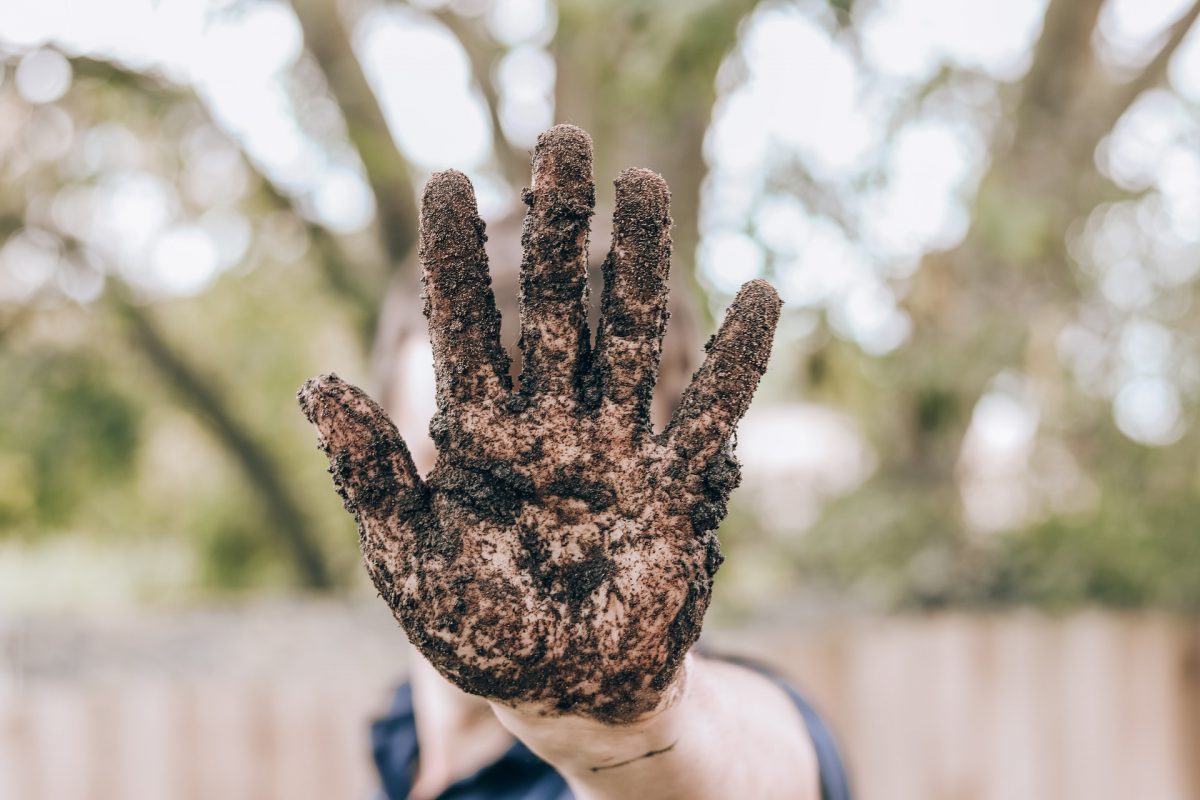Jesus with the Pastor: What God Does with Our Dirt

When I was in seminary, I often traveled long distances by bus. Greyhound used to have a $59 ticket to anywhere in North America. The price fit my budget and the timing fit my personality. I didn’t mind a long bus ride when I had a handful of books and a day and a half to dig in. But I had to be very careful because sometimes people would get on the bus hoping to make a best friend before the next stop. Not me. I just wanted to read my books and enjoy some solitude. I discovered a trick to keep the seat next to me open. While bus-travel is best done lightly, one item I always brought with me: my pillow. Have you ever seen an old pillow outside its case? It can be a bit off-putting. Snuggling up to my uncased pillow often kept the seat next to me open. Why? Because nobody wants to sit next to a dirty pillow. We don’t like being next to dirt…at all!
Think for a moment about all the phrases that use the word “dirt” or an equivalent. Heard of a dirty movie? Given a dirty look? Did you used to have a potty mouth or been forced to do the dirty work? You might hope to become filthy rich, but you don’t want someone to dig up the dirt on you. Why? Because we hide our dirt; we clean up our minds and hearts and language. We not only put covers on some pillows to hide their dirt; we cover our souls. We worry that some parts of our past might never come clean.
Psychologist Alfred Adler said that dirt keeps people away from us. But “dirt” doesn’t just keep other people away; it seems to create a separation from God. Uncleanness was a way of describing people’s defilement before God, so the Old Testament has specific ways of helping people become ritually clean. Leviticus 12-15 describes ways of becoming clean because of impurity coming from blood, skin diseases, and other bodily fluids. Leviticus 16 describes the Day of Atonement—when uncleanness and rebellion is gathered together and cleansed. Both the Israelites and the Tabernacle (Tent of Meeting) are cleansed to be in God’s presence. This combination of uncleanness and sin comes through the prophet Isaiah, as well, who said that he was a man of unclean lips and came from a people of unclean lips (Isaiah 6:5).
Now, why this lengthy discussion about dirt? Because it gives us depth to understanding what Jesus does in John 13:1-17, the last supper. Back in John 1, John said that the Word was made flesh and dwelt among us (1:14). The noun of this verb “to dwell” is the same word that the Septuagint (the Old Testament translated from Hebrew to Greek) uses for tent or Tabernacle (Tent of Meeting). Before the temple was built, the Tabernacle was the place where God would meet with his people. It was a portable location for the presence of God while the Israelites were wandering in the wilderness after leaving Egypt. In John 1:14, John is saying that the enfleshed Word is the Tabernacle, the presence of God. Of course, in John 2, Jesus says that his body is the temple that will be raised after three days. Now notice what is happening here: rather than the disciples getting cleansed to come into Jesus’ presence, the tabernacling presence/temple of God is washing the disciples. We are not cleansed before we come into the presence of God; God in Christ comes to cleanse us! How amazing, then, are the words of Jesus, “And you are clean” (v. 10)!
But this is a specific type of cleaning. Notice the posture Jesus takes: After supper, Jesus took off his outer clothing, and wrapped a towel around his waist. The Greek word for “took off” can also be translated “laid aside” or “laid down”—exactly what Jesus said he will do with his life for the sheep (10:15). Further, wrapping a towel around his waist was taking the posture of a slave and washing feet was doing the work of a slave. Jesus maintains this posture into the next day because that’s when Jesus dies a slave’s death on the cross. In this death, God hands down the sentence for uncleanness, but also takes the sentence on himself. Or, as Isaiah says it, “By his wounds we are healed” (Isaiah 53:5). Jesus dies a slave’s death and the result is that he cleanses us from all unrighteousness (1 John 1:9). Jesus lays aside his clothes to take up the towel to wash his disciples’ feet and he keeps the slave’s towel to lay aside his life to wash our whole persons.
The enemy may remind you of your dirt—the stuff you want to keep hidden. But we must pay close attention to the tabernacling presence of God, the Word made flesh, the one whose body is the temple. He has come not to remind us of our dirt, but to make us clean! And by virtue of his sacrificial death, Jesus says to us, “You are clean!”
To read more on the presence of Jesus with the pastor, see Dr. Aaron Perry’s new book out now: Kairos Care: A Process for Pastoral Counseling in the Office and in Everyday Experiences (Abingdon Press). For a sample chapter, click “Take a Look Inside” at https://www.cokesbury.com/Kairos-Care
Featured image courtesy Sandie Clarke on Unsplash.